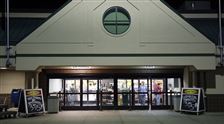Retail group has been a money losing unit
The Andersons general stores, a Toledo retail icon that for seven decades operated quirky general stores that offered shoppers a mix of everything from drywall to produce to fine wines, soon will be no more.
The Monclova Township-based company announced tonight that it plans to vacate the retail business by eliminating its money-losing retail division and closing its four stores between April to June. It has two Toledo area store and the two in Columbus that employ 1,050 full-time and part-time workers.
 Employees with The Andersons work in the foyer of the Talmadge shop at closing on January 15. Employees were told at a company-wide meeting that the store will be closing its retail division.
Employees with The Andersons work in the foyer of the Talmadge shop at closing on January 15. Employees were told at a company-wide meeting that the store will be closing its retail division.
Employees were given the bad news tonight during mandatory meetings held after the stores closed.
The closings, a monumental psychological blow to the Toledo area, likely were not surprising to financially savvy observers.
The retail group within The Andersons typically broke even or lost money for several years. The company said the retail group has lost more than $20 million in the past eight years. It has not made an annual profit in the division since 2008. The latest annual revenue for the retail group was $140 million in 2015.
But the stores are perhaps the most widely known part of the The Andersons in the Toledo area outside of the farm community. And the company considered the retail unit to be interconnected with its other units of grain, rail car, ethanol, and plant nutrients.
“The decision to close The Andersons stores was not easy for anyone involved, said company Chief Executive Pat Bowe in a statement. “Choosing to cease a business that has spanned 65 years and employees 1,050 people is tremendously difficult.”
The stores have been marketed by a slogan of “A store like no other” because they carry more than 100,000 items, including traditional groceries; specialty wine and beer; fresh fruits, vegetables, and meats; clothing; tools and hardware items; lawn and garden equipment; fertilizer; plants; automotive supplies; household items such as furniture, towels, lighting; and pets and pet supplies. Another draw were the stores within the stores, with spots in the Toledo area locations for a House of Meats counter and a Tony Packo’s restaurant.
Local retail experts said the company’s Talmadge Road store in Toledo will be in high demand. Its Maumee location on Illinois Avenue may prove harder to dispose of. The fate of its Columbus stores was unclear. Each store has about 160,000 square feet.
The company said there are about 650 employees affect in the Toledo area and 400 in Columbus. Besides the stores, the retail division includes a 245,000-square foot distribution center in Maumee. The company said it would provide employees with severance packages, the details of which it did not disclose, and job-hunting assistance.
Since this fall there have been indications that the stores were doomed.
In October when The Andersons opened its $54 million headquarters in Monclova Township, the company moved its grain, plant nutrient, ethanol, and rail divisions into the 140,000-square foot state-of-the-art complex. The retail division, however, was left in a older building in Maumee near the company’s grain elevator off Illinois Avenue.
A week after opening its headquarters, The Andersons announced it was pulling the plug on its Sylvania Marketplace store and eliminating 96 jobs. The store closed in mid-November.
Later that month, reports began circulating that the company was planning to close all of its stores. The reports could not be confirmed and an Andersons spokesman declined to comment on such speculation.
And the retail group’s financial performance has not improved in the past few years. In the company’s most recent quarterly financial filing in November with the U.S. Securities and Exchange Commission, it had a pre-tax loss of $1.6 million. The unit had a pre-tax loss of $2.6 million for the first nine months of 2016, and is expected to finish with an annual loss once those figures are reported in early February.
Mr. Bowe, The Andersons’ CEO who was hired in 2015, told The Blade in June how difficult it was for the company to keep operating its stores.
“The company has looked at this for many years. It’s not core to our strategy going forward in the grain and agricultural businesses that we’re in,” Mr. Bowe said “We like our stores. We like the relationship with the consumers that we have. It’s part of our brand back to the community.
“Most people think The Andersons are the stores. They don’t even look up and see that big grain elevator with the sign on it. They kind of just look at the stores,” he added.
The Andersons said it had not yet determined the full financial impact of the closings, but would have an impairment charge of $6.5 million in the fourth quarter of 2016 when its quarterly and 2016 annual earnings are reported next month. It expects to take a charge of $9 million to $14 million in the first half of this year for severance and other costs associated with the closings.
The retail division began in 1952, five years after the agribusiness began. Adding to stress on the company was the first financial loss for a year suffered by The Andersons in 2015 since it began selling public stock in 1996.
It is possible that The Andersons could have been getting pressure from Wall Street to get rid of its retail. Approximately 74.4 percent of its stock, which is traded on the Nasdaq market, is owned by Institutional investors or mutual funds. One such investor, HC2 Holdings Inc., suggested last year that it wanted to buy parts of the Toledo area business but it would sell off the stores. Institutional shareholder pressure has prompted similar moves by other companies.


